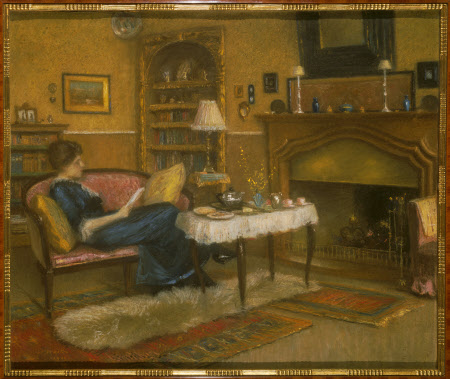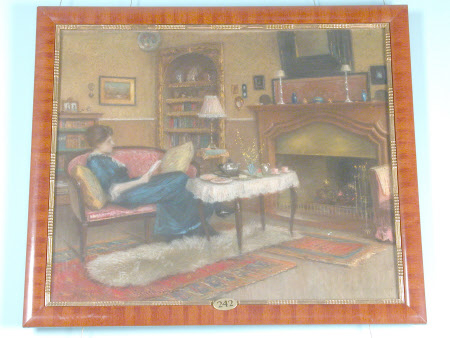Gioconda Mary Hulton (1887-1940) in the Palazzo Dona, Venice
William Stokes Hulton (1852 – Venice 1921)
Category
Art / Drawings and watercolours
Date
1913
Materials
Gouache on paper
Measurements
560 x 670 mm
Place of origin
Venice
Order this imageCollection
Attingham Park, Shropshire
NT 607895
Summary
This painting depicts Gioconda Mary Hulton (1887-1940) in the Hulton family home, Palazzo Dona, in Venice. The painting was done by Gioconda's father, William Stokes Hulton (1852 – Venice 1921), in 1913. Gioconda was the elder sister of Teresa Hulton (1890-1972), who became the 8th Lady Berwick of Attingham Park upon her marriage to Thomas Henry Noel-Hill, 8th Baron Berwick, in 1919. The painting depicts an interior view of the Hulton's Venetian home with Gioconda seated reading. The Hulton family home was opposite the Church of SS. Giovani e Paolo in Venice (called by the Venetians San Zanipolo) and the area was known as Campo San Zanipolo. As children, Gioconda and Teresa fed pigeons in the nearby Piazza San Marco. Mr and Mrs Sargent Curtis lived at Palazzo Barbaro, near Palazzo Dona, and their cousin John Singer Sargent stayed with them. John Singer Sargent became friends with William Hulton. William Hulton was also friends with the artist Reginald Barratt and Walter Sickertt, who would go on painting trips in Italy together. Gioconda Hulton, nicknamed Gio, was born on 5th October 1887 in Venice. She died on 18th of Septemebr 1940 in a motor coach accident and was buried in Nice, France. She had been staying there whilst awaiting an opportunity to escape from Vichy, France, to go and live with her sister at Attingham. The painting is done on paper in gouache, a type of opaque watercolour. The opaque effect of gouache comes from the addition of white pigment or chalk alongside the coloured pigments used in the paint. The painting is in a glazed mahogany veneered frame with a ridged gilt slip. Number '242' on frame.
Provenance
Attingham collection; bequeathed to the National Trust by Edith Teresa Hulton, Lady Berwick (1890-1972).
Credit line
Attingham Park, The Berwick Collection (National Trust)
Marks and inscriptions
W.Hulton 1913 (signed and dated bottom left)
Makers and roles
William Stokes Hulton (1852 – Venice 1921), publisher

